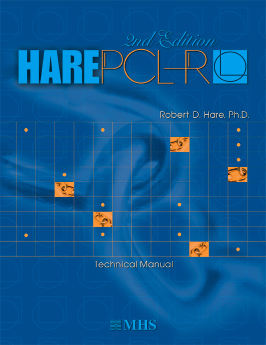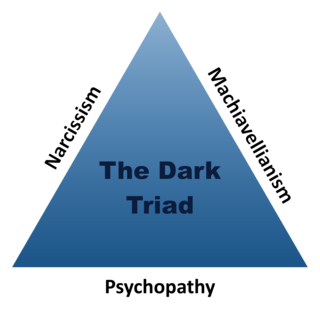Antisocial personality disorder, sometimes referred to as dissocial personality disorder, is a personality disorder characterized by a limited capacity for empathy and a long-term pattern of disregard for or violation of the rights of others, starting before one was 15 years old. Other notable symptoms include impulsivity, reckless behavior, a lack of remorse after hurting others, deceitfulness, irresponsibility, and aggressive behavior.

Remorse is a distressing emotion experienced by an individual who regrets actions which they have done in the past that they deem to be shameful, hurtful, or wrong. Remorse is closely allied to guilt and self-directed resentment. When a person regrets an earlier action or failure to act, it may be because of remorse or in response to various other consequences, including being punished for the act or omission. People may express remorse through apologies, trying to repair the damage they've caused, or self-imposed punishments.
Criminal psychology, also referred to as criminological psychology, is the study of the views, thoughts, intentions, actions and reactions of criminals and suspects. It is a subfield of criminology and applied psychology.

Recidivism is the act of a person repeating an undesirable behavior after they have experienced negative consequences of that behavior, or have been trained to extinguish it. Recidivism is also used to refer to the percentage of former prisoners who are rearrested for a similar offense.

Rehabilitation is the process of re-educating those who have committed a crime and preparing them to re-enter society. The goal is to address all of the underlying root causes of crime in order to decrease the rate of recidivism once inmates are released from prison. It generally involves psychological approaches which target the cognitive distortions associated with specific kinds of crime committed by individual offenders, but it may also entail more general education like reading skills and career training. The goal is to re-integrate offenders back into society.
Robert D. Hare is a Canadian forensic psychologist, known for his research in the field of criminal psychology. He is a professor emeritus of the University of British Columbia where he specializes in psychopathology and psychophysiology.
Psychopathy, or psychopathic personality, is a personality construct characterized by impaired empathy and remorse, in combination with traits of boldness, disinhibition, and egocentrism. These traits are often masked by superficial charm and immunity to stress, which create an outward appearance of apparent normalcy.

The Psychopathy Checklist or Hare Psychopathy Checklist-Revised, now the Psychopathy Checklist—revised (PCL-R), is a psychological assessment tool that is commonly used to assess the presence and extent of psychopathy in individuals—most often those institutionalized in the criminal justice system—and to differentiate those high in this trait from those with antisocial personality disorder, a related diagnosable disorder. It is a 20-item inventory of perceived personality traits and recorded behaviors, intended to be completed on the basis of a semi-structured interview along with a review of "collateral information" such as official records. The psychopath tends to display a constellation or combination of high narcissistic, borderline, and antisocial personality disorder traits, which includes superficial charm, charisma/attractiveness, sexual seductiveness and promiscuity, affective instability, suicidality, lack of empathy, feelings of emptiness, self-harm, and splitting. In addition, sadistic and paranoid traits are usually also present.
Fictional portrayals of psychopaths, or sociopaths, are some of the most notorious in film and literature but may only vaguely or partly relate to the concept of psychopathy, which is itself used with varying definitions by mental health professionals, criminologists and others. The character may be identified as a diagnosed/assessed psychopath or sociopath within the fictional work itself, or by its creator when discussing their intentions with the work, which might be distinguished from opinions of audiences or critics based only on a character appearing to show traits or behaviors associated with an undefined popular stereotype of psychopathy.

The dark triad is a psychological theory of personality, first published by Delroy L. Paulhus and Kevin M. Williams in 2002, that describes three notably offensive, but non-pathological personality types: Machiavellianism, sub-clinical narcissism, and sub-clinical psychopathy. Each of these personality types is called dark because each is considered to contain malevolent qualities.
The Levenson Self-Report Psychopathy scale (LSRP) is a 26-item, 4-point Likert scale, self-report inventory to measure primary and secondary psychopathy in non-institutionalized populations. It was developed in 1995 by Michael R. Levenson, Kent A. Kiehl and Cory M. Fitzpatrick. The scale was created for the purpose of conducting a psychological study examining antisocial disposition among a sample of 487 undergraduate students attending psychology classes at the University of California, Davis.
Callous-unemotional traits (CU) are distinguished by a persistent pattern of behavior that reflects a disregard for others, and also a lack of empathy and generally deficient affect. The interplay between genetic and environmental risk factors may play a role in the expression of these traits as a conduct disorder (CD). While originally conceived as a means of measuring the affective features of psychopathy in children, measures of CU have been validated in university samples and adults.
Psychopathy, from psych and pathy, was coined by German psychiatrists in the 19th century and originally just meant what would today be called mental disorder, the study of which is still known as psychopathology. By the turn of the century 'psychopathic inferiority' referred to the type of mental disorder that might now be termed personality disorder, along with a wide variety of other conditions now otherwise classified. Through the early 20th century this and other terms such as 'constitutional (inborn) psychopaths' or 'psychopathic personalities', were used very broadly to cover anyone who violated legal or moral expectations or was considered inherently socially undesirable in some way.
Vernon Lewis Quinsey is a Canadian psychologist. He has studied violent crime offenders, sex offenders, sexually violent predators, juvenile delinquency, and ways to predict, assess, and manage individuals with these tendencies. He testified in court that a rapist, Allen Edward Bullock, was "erotically attracted to that kind of behavior".

Karen Franklin is an American forensic psychologist. For her doctoral dissertation, she conducted research on anti-gay violence. She has also published commentaries about sex crimes, primarily expressing her opposition to the use of the hebephilia and other diagnoses in sexually violent predator regulations. She received the 2012 Distinguished Scientific Achievement Award in Psychology and the Monette-Horwitz Trust Award in 2001.
Maryanne Connell-Covello Garry is a New Zealand educational psychology academic. As of mid-2018, she is a full professor at the University of Waikato. Garry is a Fellow of the Association for Psychological Science.

Mendota Juvenile Treatment Center (MJTC) is a juvenile psychiatric facility of the Wisconsin Department of Health Services, located in the Lorenz Hall Annex on the grounds of the Mendota Mental Health Institute (MMHI) in Madison, Wisconsin. It has space for 29 patients. The inmates at Mendota usually have anti-social personality disorders who do not feel empathy, guilt, nor remorse. It uses the Mendota Juvenile Treatment Center Program.
Neurorealism is a concept within popular science where individuals ascribe more meaning to psychological phenomena merely because it is backed up by brain research, including brain imaging methods.
Raymond A. Knight is a psychologist and academic most known for his research on schizophrenia and on aggressive behavior, particularly sexual aggression, psychopathy, and bullying, exploring their causes, life course, and outcomes, and for developing the Multidimensional Inventory of Development, Sex, and Aggression (MIDSA) that assesses treatment targets for those who have sexually offended. He is a professor emeritus of Human Relations at Brandeis University.
Theresa A. Gannon is a British academic psychologist and chartered psychologist, and is a full professor at the University of Kent specialising in forensic psychology, especially of deliberate firestarters and sexual offenders. Gannon is a Fellow of the Academy of Social Sciences, and was awarded the British Psychological Society's Division of Forensic Psychology Lifetime Contribution to Forensic Psychology Award.






